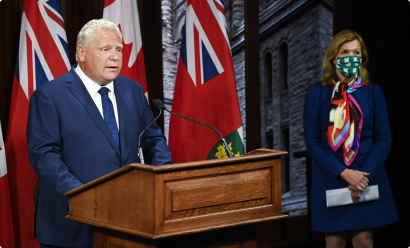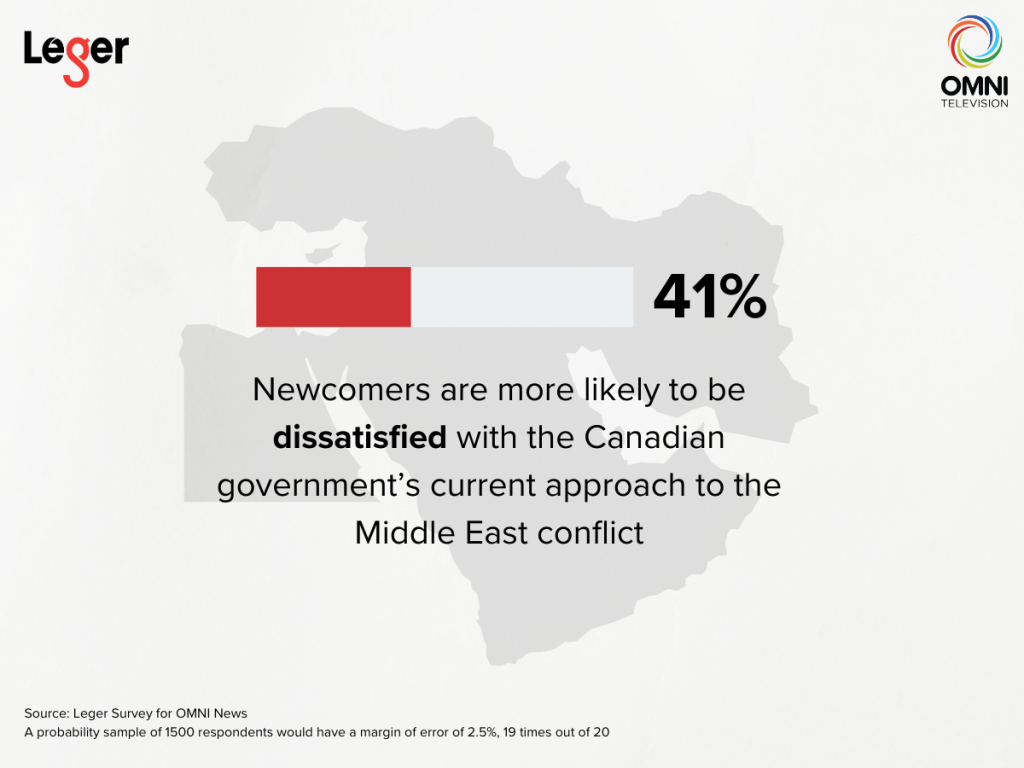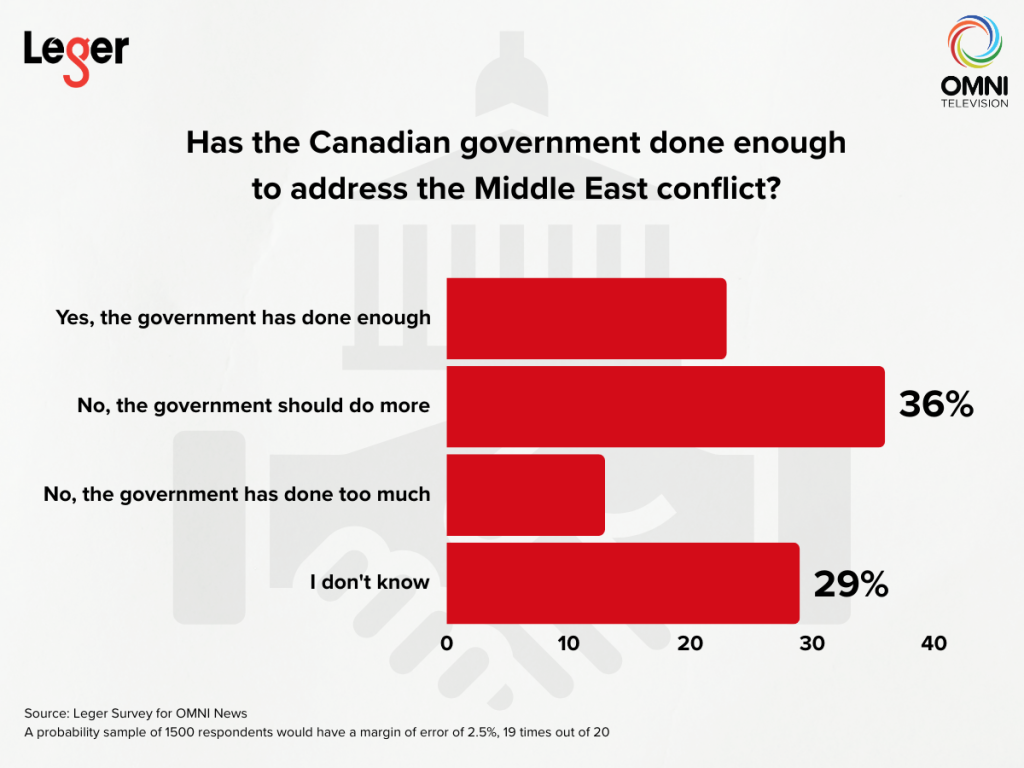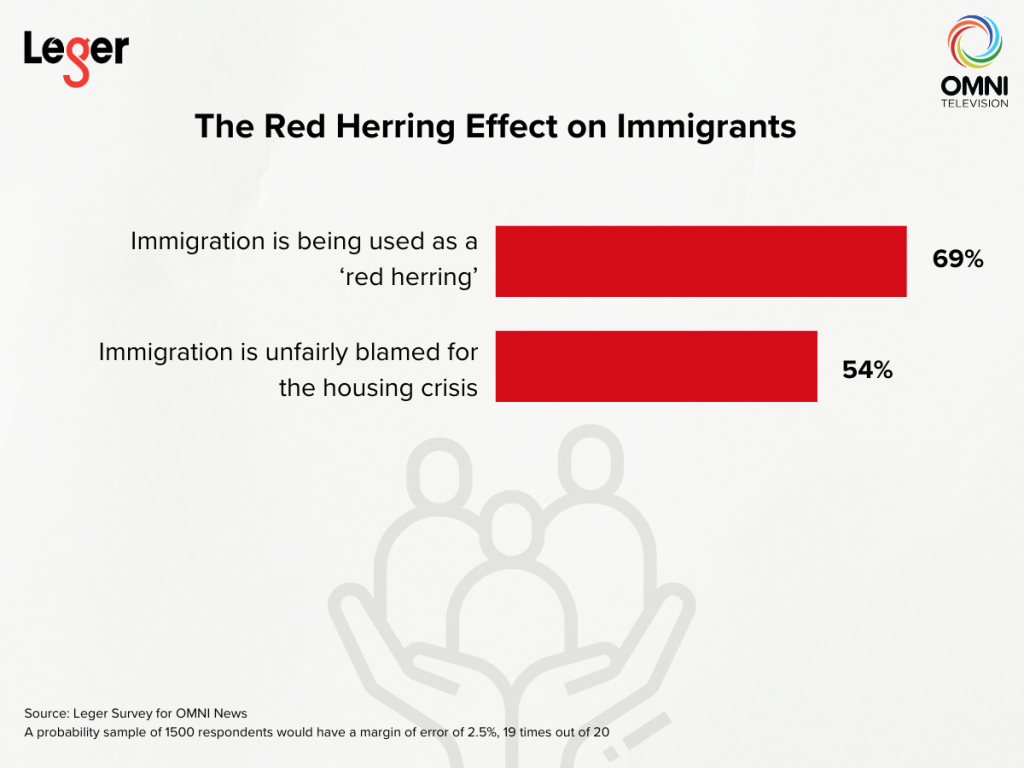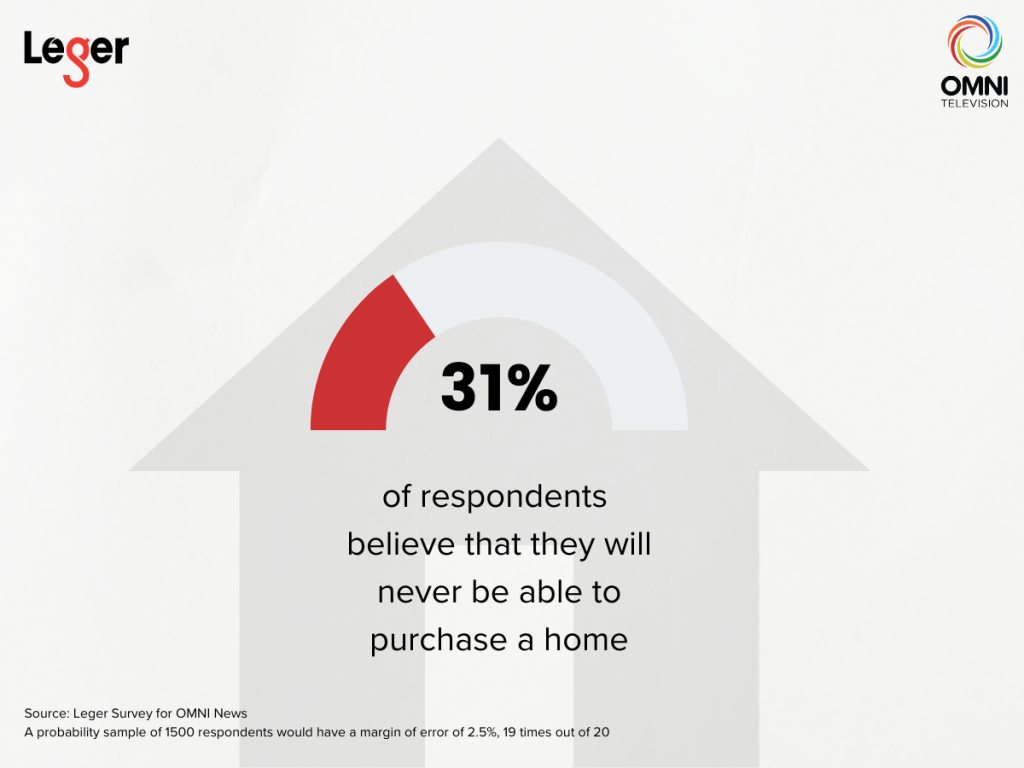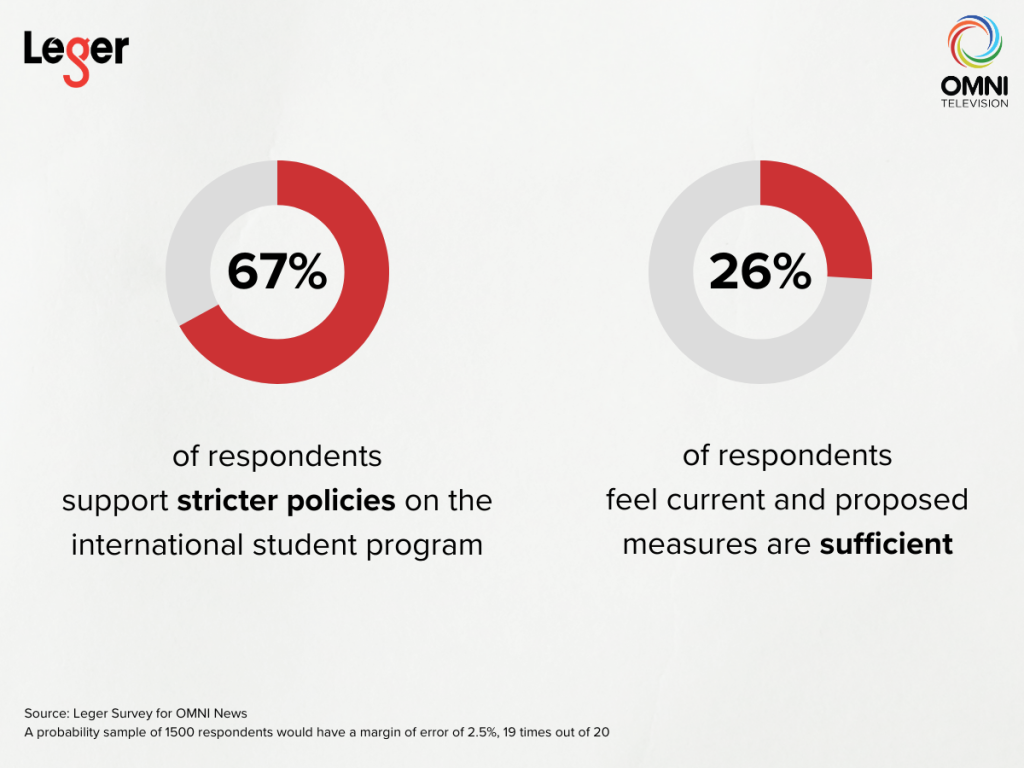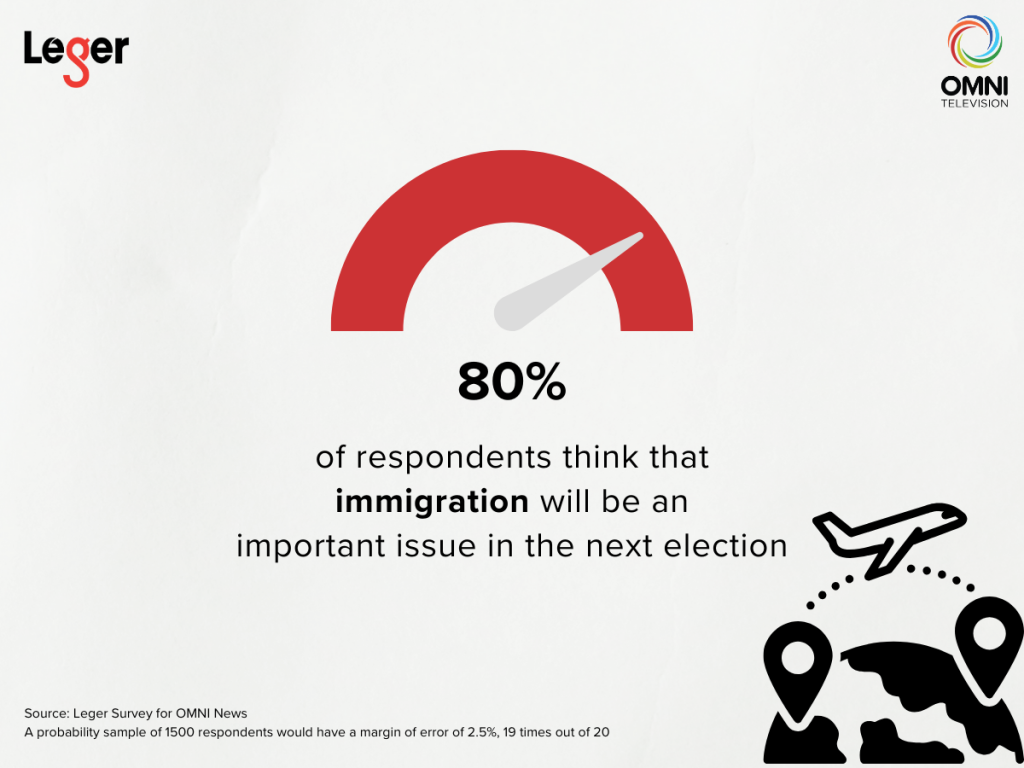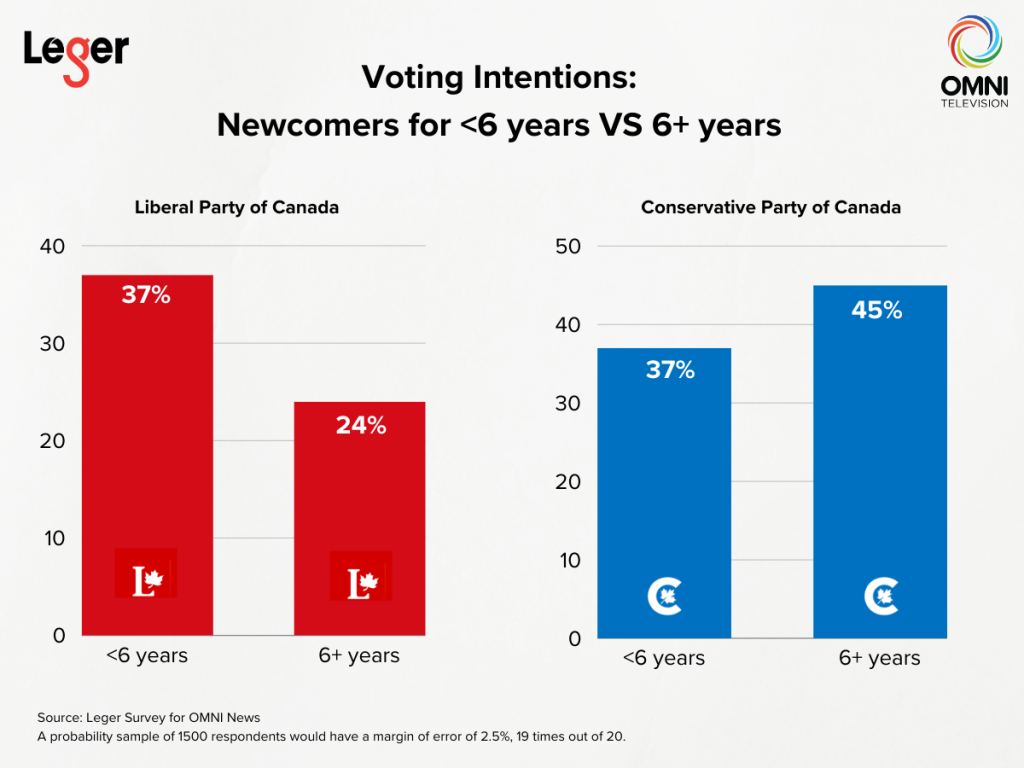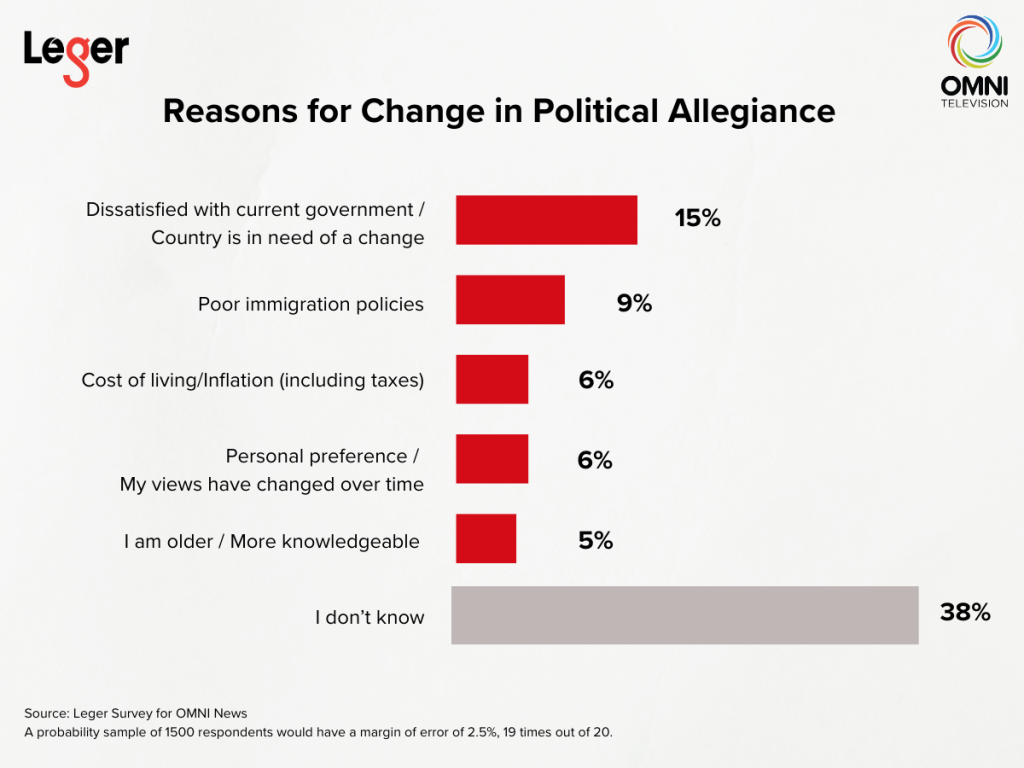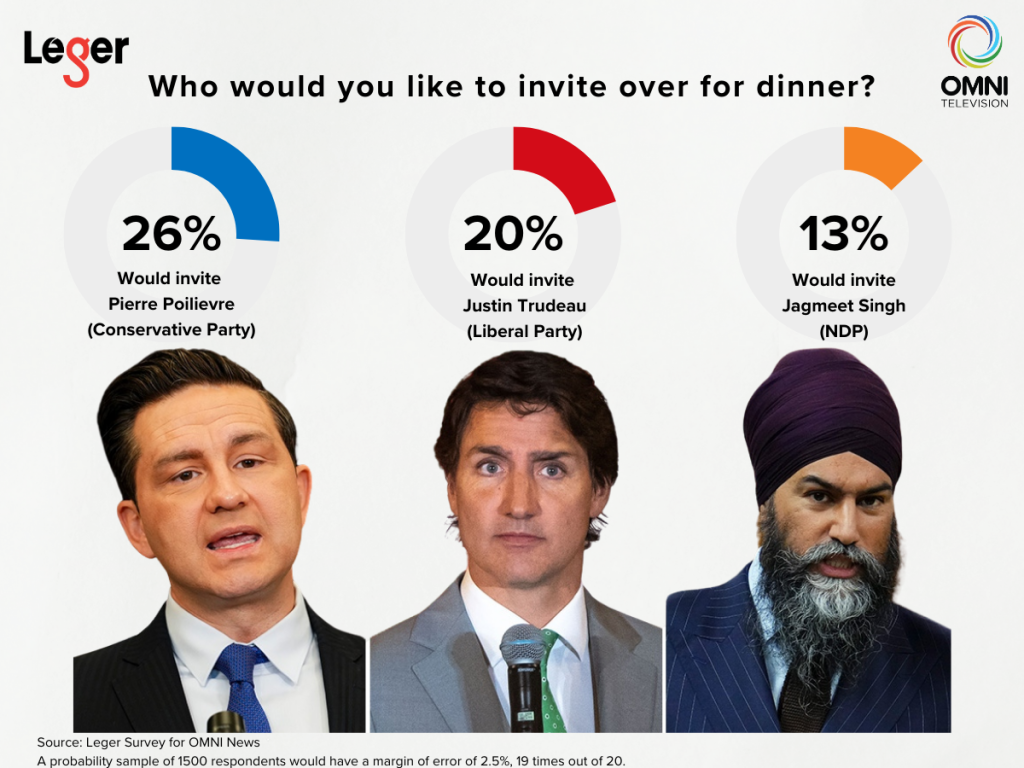OMNI News Immigrant Survey 2024
Newcomers to Canada are overwhelmingly satisfied with their choice to move to this country, but a new poll commissioned by Leger exclusively for OMNI news finds a shifting tide in government satisfaction.
The poll, which surveyed a sampling of 1500 immigrants across the country between August 28th and September 9th, 2024, finds political allegiances of immigrants have changed upon arrival to this country, and the allure of moving to Canada has been met with a somewhat harsher reality around affordability, policy and personal success.
Day 5 – Barriers to success: OMNI Poll shows majority of immigrants struggle to get ahead in the workplace, a third have faced discrimination
by Giacomo Buratti, OMNI News
For Rosalie Di Lollo, helping newcomers find a job in Canada is personal.
Her dad moved here from Italy when he was 18, and she has lived vicariously through him the challenges faced seeking employment.
“I wanted to do something about it,” she told OMNI News. “It’s not something that leaves me cold.”
Di Lollo sees many barriers to professional success facing newcomers at the Centre Génération Emploi, a Montreal employment agency. She thinks sometimes there is a lack of understanding between employers and immigrants.
“We ask [newcomers] to be Canadian before they even have a chance to understand what it means to be Canadian,” she said. “And on the other side, there is also the social responsibility that employers have.”
In an exclusive poll commissioned by Leger for OMNI, more than half of immigrants say (56%) it is harder to get promoted or grow in a Canadian workplace. The survey found the sentiment especially true for those who have been in Canada less than 6 years, younger individuals, and those who identify as BIPoC, particularly those of South Asian descent.
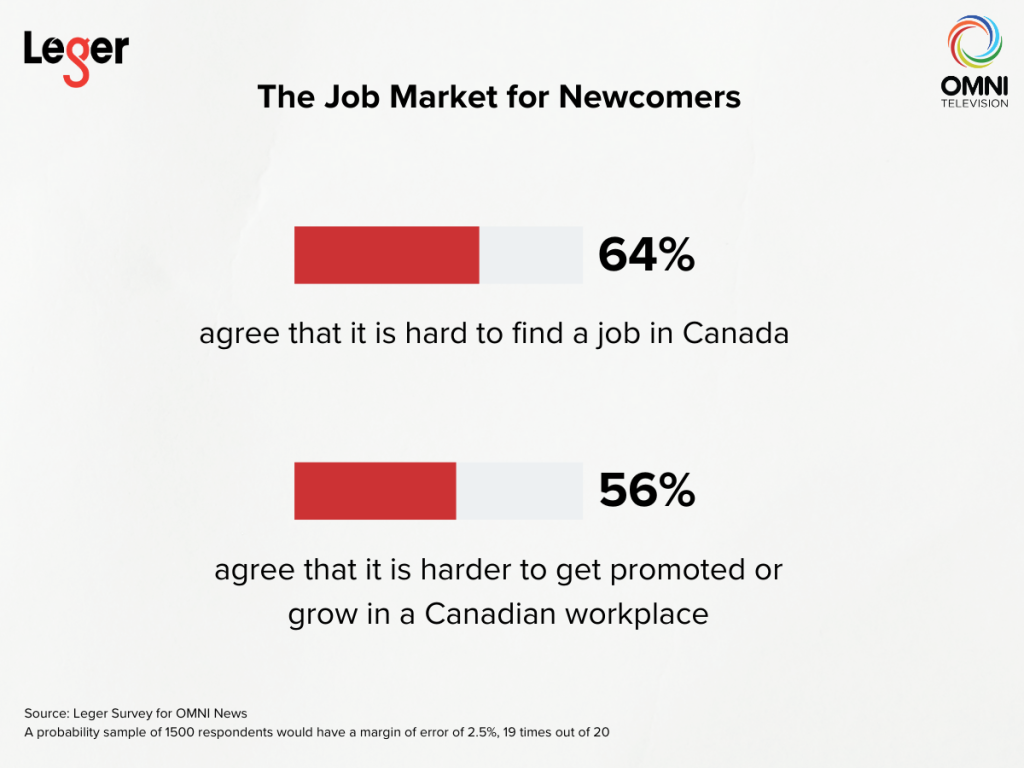
“Their Canadian Dream is already dead.”
Many waiting to see their qualifications recognized are forced to work survival jobs, as they try to manage school or professional development courses with the need to keep a roof over their heads.
“Their Canadian Dream is already dead, because of that lack of credential recognition,” says Austine Gaqui, a Filipino nurse who waited 15 yeas for an Ontario license. “They need to study, they need to upgrade, they need to take extra courses in order to meet the gap for education.”
The OMNI-Leger poll highlights that the lack of recognition of foreign credentials is a key issue faced by immigrants looking to advance their careers in Canada. Furthermore, two in ten immigrants report additional barriers related to their accent or language proficiency.
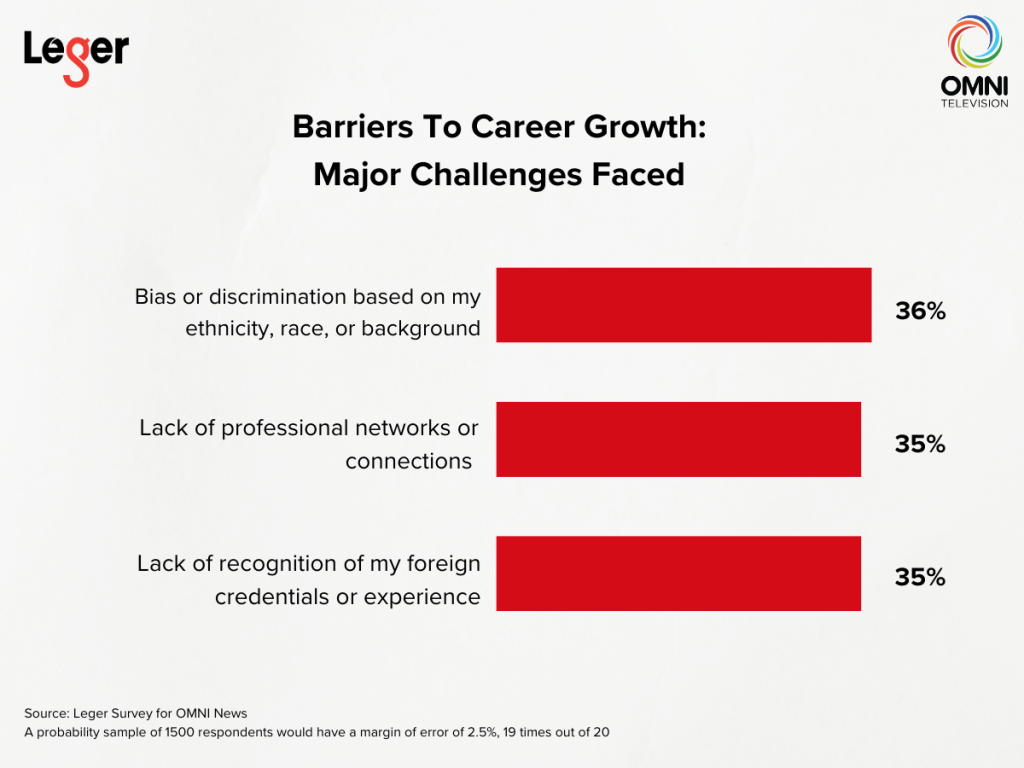
“That’s not a good way of doing business.”
Speaking to OMNI News last week, Immigration Minister Marc Miller said that while the system values foreign experience when people apply to come to Canada, it’s “unfortunate” that the same is often not true when they get here.
“That’s not a good way of doing business,” he said. “That’s not fair for the individuals that we’ve made promises to.”
The minister added that some progress has been made, but the recognition of foreign credentials is “almost entirely” under provincial jurisdiction, and it’s “wildly misleading” to suggest that “the federal government can wave a wand and make it happen.”
“It’s important to put pressure on provinces to make sure they are competing with each other to reduce the barriers,” he said. “But we have too many professions that are far too heavily regulated, sometimes by organizations – self-regulating organizations – that probably, absolutely have to do a better job in making sure that there are more seamless ways to get qualified in Canada.”
At MOSAIC, a British Columbia immigrant serving organization, Olga Stachova agrees, adding that “as a society we haven’t figured out how to fully utilize the expertise and training that immigrants bring.”
But she told OMNI News that some barriers don’t just make it hard for newcomers to enter the job market, they also persist throughout their careers, even in a province where new Canadians make up a large percentage of the population.
“Immigrants represent a very small fraction of senior leadership positions in B.C.,” she said. “We are talking single digit numbers. In particular, racialized immigrants and racialized immigrant women, who represent less than 1 per cent of our leadership positions.”
“Racism is there, and so is discrimination.”
The OMNI-Leger poll also highlights that over a third of immigrants have faced discrimination at work – with majority citing ethnic, racial or cultural biases as a top reason for difficulty advancing their careers. These barriers are more salient amongst younger immigrants and those who identify as BIPOC.
“Racism is there, and so is discrimination,” Harinder Mahil, former chair of the British Columbia Human Rights, told OMNI News.
“When you find two candidates who are equally qualified,” he said, “the preference generally will go to somebody who’s Canadian, who’s white, and that is there. It’s difficult to prove, that the person has been a victim of discrimination, but it does happen.”
The OMNI-Leger online poll was conducted between August 28th to September 9th, among a random selection of surveyed 1500 respondents who were not born in Canada. A probability sample of this size would have a margin of error of 2.5%, 19 times out of 20.
Day 4 – Immigrants Back Ceasefire in Middle East conflict, Majority Dissatisfied with Ottawa’s action: OMNI News Poll
by Giacomo Buratti, OMNI News
A year into a conflict that has killed thousands of people in the Middle East, the vast majority of immigrants support calls for a ceasefire, though many are still uncertain about a solution.
“It’s an issue that hits a bit closer to home for some newcomers,” says Andrew Enns, Executive Vice-President with Leger.
“I don’t think a day goes by in the news media that we’re not seeing in some cases fairly horrific images out of the Middle East,” he told OMNI News. “For a lot of Canadians, they would like just to see that stop. And they see a ceasefire as not necessarily picking sides, [but] as just – stop throwing bombs at one another.”
A new poll commissioned by Leger exclusively for OMNI News found that 71 per cent of the immigrants surveyed want Israel and Hamas to lay down their arms. More immigrants are dissatisfied with Ottawa’s approach to the conflict at 41%, while 29% expressed satisfaction. The remaining 30% said they do not know.
The poll was conducted before the latest round of hostilities in Lebanon last week and Iran’s missile attack on Israel Tuesday.
“[People] know about the issue, but they don’t know what really is the best course of action for their government. It’s an intractable problem,” says Enns.
Calling the situation in Gaza “catastrophic,” Canada has been demanding an “urgent ceasefire” to protect civilians and ensure humanitarian assistance can be delivered to those in need.
When asked whether the Canadian government has done enough to address issues related to the conflict in the Middle East, majority of immigrants (36%) feel the government should do more, while a third could not answer. Of those who believe Ottawa needs to do more, nearly half of immigrants believe the federal government should step up its diplomatic efforts and provide more humanitarian aid, while 27 per cent would like Canada to welcome more Gazan refugees.
The pollster explains that while the percentage of survey participants who can’t answer a question is usually much lower, on the war in the Middle East many are “legitimately struggling” with the issues raised by the conflict.
“They do find that these issues have been going on for a long time and if there was a simple answer, or a simple path for the government of Canada to pursue, I suspect we’d be on it already,” he told OMNI News.
More than two-thirds of respondents also said Canada should focus more on domestic issues, and that there are too many protests and demonstrations from either side.
Over the summer, pro-Palestinian encampments were erected on university campuses across the country, with some schools seeking help from the courts to dismantle them.
Police in cities like Toronto and Vancouver have stepped up patrols ahead of the October 7th anniversary of the Hamas attack on Israel. The OMNI-Leger online poll was conducted between August 28th to September 9th, among a random selection of surveyed 1500 respondents who were not born in Canada. A probability sample of this size would have a margin of error of 2.5%, 19 times out of 20.
Day 3 – Blaming Immigration: Majority of new Canadians feel they are being unfairly blamed for housing crisis, according to new OMNI poll
by Giacomo Buratti, OMNI News
As the housing affordability crisis continues to impact Canadians across the country, a majority of immigrants feels they are being unfairly blamed, as they themselves see the dream of home ownership slip further out of reach.
A poll commissioned exclusively for OMNI by Leger found that nearly seven in 10 new Canadians think politicians are using immigration as a “red herring” to distract from other factors contributing to the lack of affordable housing, such as government policies and economic conditions.
The federal government is planning on bringing the share of temporary residents to 5 per cent of Canada’s total population, down from 6.5 percent.
According to a housing expert, however, “relatively high immigration numbers” don’t necessarily mean newcomers are responsible for high shelter costs.
“One big issue, as we know, is that some areas just have a higher percentage of population of new immigrants than they used to, and as a result they get used as a scapegoat for the housing crisis,” says Prentiss Dantzler, the Director of the Housing Justice Lab at the University of Toronto. “People forget that this housing crisis is not new. We’ve been dealing with this for a long time.”
“There’s a lot of blame to go around, but a lot of time people are focusing on other individuals and not focusing on the housing system itself,” he told OMNI News.
Dantzler points out that a lot of the housing stock is not even being bought up by individuals, but by private equity firms or other companies, and that the number of condos on the market means the system “is not serving a diverse portfolio of families.”
There’s a lot of blame to go around
“What we really need to do to overcome the housing crisis is to build more houses,” says Sabine El-Chidiac, at the Consumer Choice Center. “The fact is that there isn’t enough for the people that need them.”
A former policy advisor to federal Immigration ministers, El-Chidiac believes politicians are scapegoating immigrants, despite being the ones responsible for the lack of affordable homes.
“They are the ones who instituted the policies that got us here,” she told OMNI News. “Every level of government has made policies that have made it more difficult for homes to be built in Canada.”
El-Chidiac says if politicians “actually cared” about solving the crisis, “they would come up with ways that allow people to build more.”
Responding to the poll finding on Tuesday, however, Immigration Minister Marc Miller told OMNI News that “there’s no question” the volume of temporary residents Canada welcomed the past few years has contributed to the affordability crisis.
“That is not something you can go around denying entirely,” he added. “To what extent it contributes to it, I think, has been subject of debate.”
Miller said provincial premiers have been blaming immigrants “for 100 per cent of all ills of society,” and that is not the right approach to take.
But using scapegoats when trying to tackle complex issues is something political actors have always done, says Dantzler, who adds that if home ownership is part of the Canadian dream and identity, so is the fact that Canada is a country of immigrants.
“We need to put that first,” he says, “and not use it as a political tactic to divide people when it’s politically feasible or advantageous for us to do so.”
Housing: “A Mirage for an Immigrant”
Janice, who moved from China to Toronto, is waiting to become a permanent resident to try and make an offer on a condo.
“I know that now the Canadian government wants to cut down a lot of temporary residents,” she told OMNI News. “So housing prices will be dropping, eventually .”
The OMNI-Leger Poll found that owning a home is part of the Canadian Dream for 85 per cent of newcomers, with more than double compared to last year defining that Canadian dream as the ability to purchase one’s own home.
But the possibility of achieving this dream appears to be bleak, according to many respondents. Forty-nine per cent disagreed that home ownership is a possibility for all immigrants who come to Canada. Of those who are currently renting, three in 10 polled say they will never be able to buy a home.
Pietropaolo Frisoni, a recent immigrant from Italy, says buying a home in Canada has become increasingly difficult.
“Home prices are appalling,” he told OMNI News in Italian. “Canada offers some small incentives, but overall, buying a home now is almost like a mirage for an immigrant.”
Overall, 54 per cent of immigrants feel that they are being blamed for a problem they did not create. In fact, renters, younger immigrants, those who have been in Canada for less than 6 years, and BIPoC individuals feel it even more.
“Many immigrants who moved here in the early 00s or in the 90s – it was much easier then to become a citizen and buy a house,” says Frisoni. “It’s different for us now. We must be patient.”
The OMNI-Leger online poll was conducted between August 28th to September 9th, among a random selection of surveyed 1500 respondents who were not born in Canada. A probability sample of this size would have a margin of error of 2.5%, 19 times out of 20.
Day 2 – Majority of immigrants support stricter policies on international student program: OMNI poll
by Giacomo Buratti, OMNI News
A new poll commissioned by Leger exclusively for OMNI found that two-thirds of immigrants (67 per cent), particularly those who have been in Canada for over six years, back stricter international student policies. Support for stricter policies jumps to 77 per cent among South Asian immigrants in particular.
Some students already in Canada, however, are feeling the squeeze. Yuehan An, a Chinese national, moved to Toronto three years ago to pursue a business degree.
He says recent changes to the eligibility criteria for the Post-Graduation Work Permit that restrict access to college students have him worried he’s not competitive enough.
“Doing a Master’s Degree is like mandatory for me,” he told OMNI News.
The new policy changes are affecting graduate students too, risking Canada’s attractiveness for new talent, according to student Sherry Kashi.
Staying in Canada is getting harder.
Originally from Iran, Kashi came to Canada as an international student in 2019, became a permanent resident, and is now a PhD candidate at York University.
“[International students] know that staying in Canada is getting harder, the path to permanent residency is getting harder,” she told OMNI News. “They are waking up every day just checking the news first. They know it’s going to be harder, but still they are not certain how hard it’s going to be.”
However, international students are at the heart of a growing debate about the economic impact of immigration – an issue that could play a key role at the ballot boxes when Canadians head to the polls.
The OMNI-Leger poll found that 8 in 10 immigrants believe immigration will be an important issue in the next federal election, while over half of respondents said immigration policies put forward for the election will influence the way they vote.
Speaking to OMNI News Tuesday in response to the released poll data, Immigration Minister Marc Miller was glad to hear of the support for recent measures but says they need to work.
“We don’t do everything by poll, it’s nice to know that the measure is popular. I think it’s even more important to know that these measures actually work. Tentatively we see that these measures are working, it makes for a more manageable international student visa program,” the minister told OMNI News.
Ottawa started clamping down on foreign students in January, and has since brought in restrictions aimed at reining in the number of temporary residents Miller said have “exploded” in the last few years.
However, while the survey shows widespread support for a crackdown, some are accusing Ottawa of “[throwing] international students under the bus.”
International students are too easy to blame.
Yvonne Su, the director of the Centre for Refugee Studies at York University, says she doesn’t disagree with the need to cap the number of international students, but criticizes the “turbulent” rollout of the new policies, highlighting a lack of consultation with key players.
Michael McDonald, with Colleges and Institutes Canada, adds that the lack of collaboration with the sector and with the provinces is “deeply concerning.”
The association advocating for the country’s post-secondary institutions warns that recent changes to the International Student Program “will actually make many of our pressing challenges so much more difficult to address,” and will deepen the funding crisis facing Canada’s public education system.
McDonald believes the new measures have created uncertainty for both the students and the communities that rely on them to fill roles in strategic sectors of the economy.
One in 4 immigrants interviewed by Leger for OMNI, and particularly younger immigrants and those who identify as BIPoC, think new and proposed rules are sufficient to prevent abuses within the International Student Program.
Su, however, highlights the racial dimension of the issue, calling for an honest discussion on the real-life implications of the blame game around international students.
“When we talk about international students we are not talking about the ones from Britain, from Germany, from Australia, which are also here,” she said.
“To a certain extent, Canada invited them here. We asked them to come and we told them the stories of permanent residency. We told them the stories of them being able to work and earn a lot of money. We didn’t explain the hardship. And we definitely didn’t explain the racism and xenophobia.”
The OMNI-Leger online poll was conducted between August 28th to September 9th, among a random selection of surveyed 1500 respondents who were not born in Canada. A probability sample of this size would have a margin of error of 2.5%, 19 times out of 20.
Day 1 – Shifting Political Allegiances: New OMNI poll shows immigrants supporting Poilievre
by Giacomo Buratti, OMNI News
When Mark Gravoso arrived in Canada from the Philippines in 2017, he thought he would be a matter of months before he could start working as a registered nurse. He ended up waiting four years to obtain his licence, forcing him to take what he calls “survival jobs” to get by.
And as the next federal election approaches, Gravoso, a first-time voter, shared why he will be supporting the Conservative Party led by Pierre Poilievre.
“[The federal Liberals] should have focused their attention on the health care system,” he told OMNI News. “There’s a lot of health care professionals, like foreign-trained doctors, foreign-trained nurses, and yet they are not utilized properly.”
Like him, seven in 10 newcomers say they are motivated to go to the polls, and believe it is time for a change in government in Canada, according to a new poll commissioned by Leger exclusively for OMNI News.
The survey found 45 per cent of immigrants have changed their political allegiances since moving to Canada, particularly those who say they intend to vote Conservative.
Support for the Tories is stronger among newcomers who have been in Canada for six years or longer, but overall, 44 per cent of respondents said they would cast their ballot for the Conservatives if elections were held today – an 18-point lead over the Liberals at 26 per cent, while 19 per cent would vote NDP.
“Newcomers to Canada tend to vote for the party which is in power at that time,” said Manan Gupta, who moved to Ontario from India over 20 years ago.
“But when you look at those who have been here for longer,” he told OMNI News, “they can actually compare how was the governance of previous parties and what were the kind of economic situations that that time.”
Dissatisfaction driving political allegiance shift
Jenny Yang moved to British Columbia from China six years ago, and while she told OMNI News that she hasn’t made up her mind yet on who to vote for, she expressed concern about the government’s handling of key files.
“Housing prices have been rising rapidly,” she said. “And the government hasn’t come up with effective measures to control this problem.”
The OMNI-Leger poll found dissatisfaction with the current government tops the list of reasons provided by newcomers who said their political allegiance has changed, followed by poor immigration policies.
However, a lack of clarity in the Conservatives’ plan for immigration is the reason Filipino-Canadian Allan Ralph Basa is dissatisfied with the Tories.
“Their approach on immigration is just ‘common sense.’ We deserve more than that,” he told OMNI News. “We need to know because immigration has become a very serious, pivotal concern and issue in this coming election.”
Basa came to Canada in 2012, and in 2015, he voted for former Prime Minister Stephen Harper against Justin Trudeau. This time, he will again vote for the incumbent, even if that means switching sides.
Guess who’s coming for dinner?
But when it comes to political leaders, immigrants, particularly those who have been in Canada for more than six years, would rather share a meal with Poilievre than Trudeau or NDP leader Jagmeet Singh.
The OMNI-Leger poll found that while 28 per cent of those surveyed do not know which federal leader they would invite to dinner, 26 per cent would like to break bread with Poilievre, compared to just two in 10 that would choose the current Prime Minister.
Andrew Ennes, Executive Vice-President with Leger, found the data somewhat surprising.
“The immigrant population is picking up on many of the same concerns and sentiments that Canadians writ large are picking up on,” he told OMNI News.
And with immigrants making up a significant share of the population in key battleground ridings, the pollster says it will be “very challenging for a political party to forsake the immigrant vote in a general federal election and expect to do very well.”

